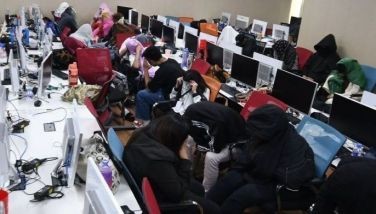Palace to closely monitor peso appreciation
MANILA, Philippines - Malacañang said yesterday it is closely monitoring the appreciation of the peso against the dollar to see what can be done to address its impact on the local economy and on ordinary Filipinos.
“We’re watching the situation and it’s difficult to say right now whether the weakness in the dollar will be temporary or sustained. There are many fundamental issues with the US economy that President (Barack) Obama and (US) Congress are working on. So it’s difficult to make a prediction at this point,” Presidential Communications Development and Strategic Planning Office Secretary Ricky Carandang said.
He stressed the weakening of the dollar “is a phenomenon that is beyond our control.”
An eleventh-hour deal between the White House and the US Congress averted a debt crisis.
Carandang said in a press briefing that the government would have to evaluate the positive and negative effects of the peso appreciation.
Carandang explained while it would be good for debt servicing, a stronger peso would also decrease the value of overseas Filipino workers’ remittances. A stronger peso also has adverse effect on the country’s exports.
“What’s difficult is this is, as I said, beyond our control. So our concern is to make sure that these fluctuations in the exchange rate are not so volatile that they will cause temporary problems,” Carandang said.
But he said compared to other countries, the Philippines was still doing okay with the relative appreciation of the peso compared to other regional currencies.
“So the exporters will have some adjustments to make but the adjustments being made by exporters in countries like Singapore, Thailand, and other Asian countries will be greater than the adjustments that we will make,” Carandang said.
“But it’s possible that because of the relative appreciation of the other currencies, this might even help our exporters over the medium term,” he said.
“But it’s hard to speculate on the peso-dollar exchange rate and what its short and long-term effects would be because we don’t even know how long this will last,” Carandang said.
On Monday, Carandang said President Aquino ordered the economic team to conduct an assessment of the possible effects on the country of the US debt crisis.
“The President expressed some concern about it and the economic team had already begun to discuss this even before the President expressed the concern. So they’re on board, they anticipated what the President would want them to do,” Carandang said.
“He wanted to know what the possible effects would be of something like this. He expressed some concern about the rising peso and the impact that that would have it on exporters and he asked the team to take a look at all the possible effects of this development,” he added.
Carandang said the economic team would come up with some recommendations based on their assessment.
He also expressed confidence that the US government “will not allow the situation to reach such a proportion where they would actually default,” he said, citing the deal between the US Congress and Washington.
“It’s true that many of the issues that are contentious have been pushed back so that they can debate them and decide the matter (on a) later date,” Carandang said.
Meanwhile, an administration lawmaker urged the Aquino administration to set in place safeguards in the country’s financial system to protect it from currency speculators who might take advantage of the current dollar movement.
Ang Kasangga sa Kaunlaran party-list Rep. Teodorico Haresco, an economist, issued the statement as the peso climbed on Monday to its strongest level in 39 months, breaching the P41 to $1 level.
“We should start imposing capital controls as our peso is artificially appreciating versus the US dollar,” Haresco, vice chairman of the House committee on small business and entrepreneurship development, said.
He said the government, through the Bureau of Treasury or other agencies, should refrain from floating bonds in the US market and do such bond offer in other countries or tap other sources of funds such as official development assistance to raise money.
“We should stop denominating our bonds on US dollars. There is already some $100 billion inclusive of $62 billion accounted for by the Bangko Sentral ng Pilipinas as our foreign currency reserves,” he said.
He said speculators, with enough financial muscle to move hundreds of millions of dollars, could mop up the peso and sell them as soon as the currency market swings the other way, similar to what happened during the 1997 Asian financial crisis.
“It’s easy for speculators to put up honking firms to buy pesos now, wait for inflationary pressures, BOP (balance of payments) data (from the US) and wham! Dump the peso,” Haresco said.
He said speculators earn huge profits in the process, which is somewhat similar to hoarding rice. He cited the case of businessman and philanthropist George Soros, who was accused by governments in the regions of triggering the 1997 Asian financial crisis through currency speculation.–With Paolo Romero
- Latest
- Trending





























